Photo-Essay: John Minto Visits South Africa
Photo-Essay: Anti-Apartheid Leader Tours South Africa For First Time
Photographs and text by Jon Stephenson copyright © 2009
Activist John Minto, the public face of the campaign to stop the 1981 Springbok Rugby Tour of New Zealand, recently travelled for the first time to South Africa, in the midst of that country's elections.
Minto has been a strong critic of the ANC government, which has just been returned to office with a two-thirds majority -- this time led as president by the controversial Jacob Zuma.
Minto has been especially critical of the ANC's free market economic policies, and last year rejected nomination for an Oliver Tambo award because "The anti-apartheid campaign was not waged simply to enrich a few black millionaires but to bring economic and social change to benefit all South Africans."
Minto was accompanied on his trip by TV3 presenter Mike McRoberts, whose report for the network's 60 Minutes programme will screen at 7.30pm on Monday.
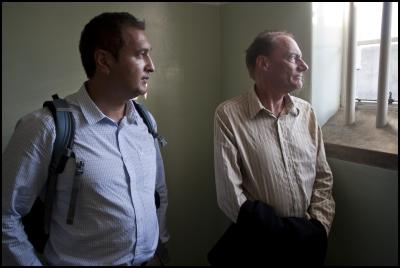
John Minto (right) and Mike McRoberts check out a cell in Nelson Mandela's prison block at Robben Island, near Cape Town. Mandela, an anti-apartheid activist and leader of the armed wing of the African National Congress party (ANC) was incarcerated for 18 years at Robben Isand prison after being convicted in 1964 on charges of sabotage and given a life sentence.
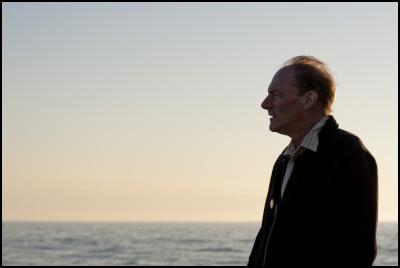
John Minto in a reflective moment on the ferry to Cape Town after visiting Robben Island, where Nelson Mandela and other political prisoners were incarcerated under South Africa's apartheid regime. After the apartheid system was dismantled and the country's first democratic election was held in 1994, the ANC came to power and Mandela became president.
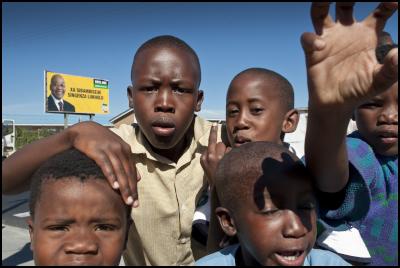
Young black children in Cape Town, with an election billboard in the background promoting ANC leader and presidential candidate Jacob Zuma. Despite concern among many South Africans at the ANC's failure to deliver in the 15 years it has been in government, and the fact that Zuma himself has been dogged by accusations of corruption and criminality, the ANC was returned to office with two-thirds of the electoral vote -- and Zuma was elected president.
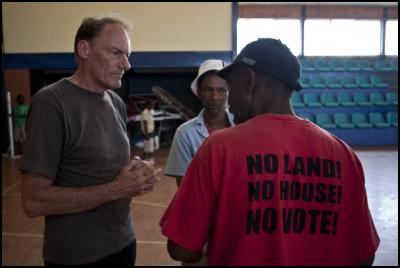
A Cape Town activist tells John Minto how police officers tear-gassed a community action group at this stadium after they refused to enrol to vote for South Africa's recent election. The group was angry at the ANC government's failure to provide adequate housing or amenities in their community, despite its three terms in government, and said they would not vote for the party they once supported.
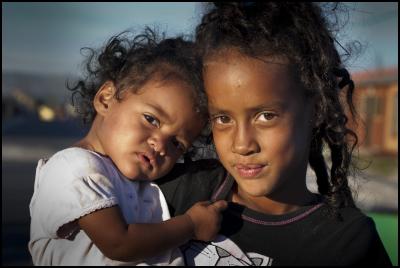
A girl holds her younger sister at Symphony Way -- an outer suburb of Cape Town -- where more than a hundred families are living in makeshift homes, literally in the gutter. The residents told John Minto they feel let down and abandoned by successive ANC governments, and are living with little hope -- not only for their own future, but for that of their children.
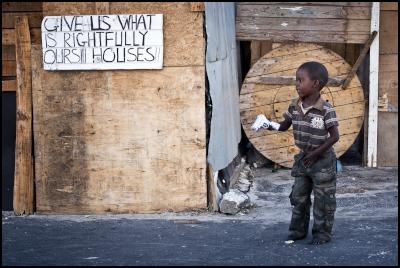
A young boy plays with a toy pistol next to ramshackle housing at Symphony Way.
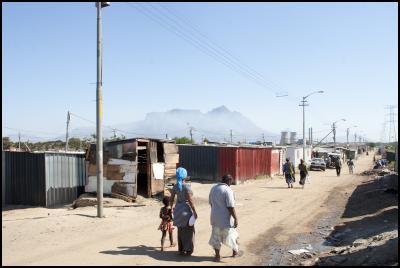
Street scene at the Joe Slovo informal settlement, with Cape Town's Table Mountain in the background. Residents live in Third World conditions, with limited access to power and water and sewage running in the streets, next to the motorway linking Cape Town's international airport with the city centre. They are facing eviction by municipal authorities in the run-up to next year's Soccer World Cup.
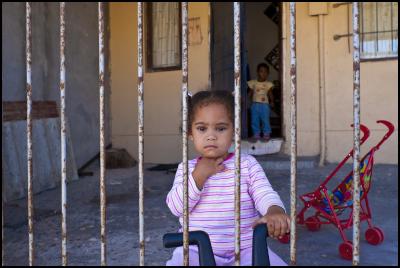
A young girl plays in her yard at New Fields village, on the outskirts of Cape Town, as another child looks on. Residents in this ANC housing project were offered apartments for 350 Rand per month on a rent-to-buy basis, but the local council sold the properties to a private company which has increased the rent to 800 Rand per month. Unable to afford this, many tenants face eviction. And while the buildings here are only seven years' old, they're of such poor quality some are already starting to fall apart. A number of people in neighbourhoods like this one told John Minto that they were better off under apartheid.
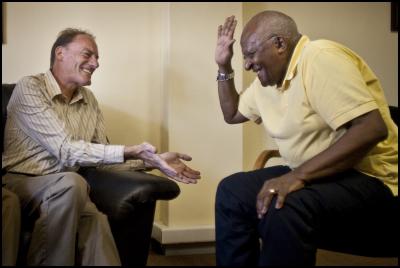
Nobel Peace Prize laureate and Cape Town Archbishop, Desmond Tutu, thanks John Minto for his activism during the 1981 Springbok Tour, which he described as "a real punch in the solar plexus" for South Africa's apartheid government. Like Minto, Tutu has been a strong critic of the ANC and its economic policies. In 2004 he said that "Many, too many, of our people live in grueling, demeaning, dehumanising poverty...What is black empowerment when it seems to benefit not the vast majority but a small elite...?" But he told Minto: "Don't give up on us, my son. Don't give up on us."
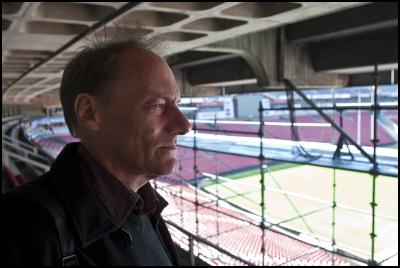
John Minto at Ellis Park rugby stadium in Johannesburg. He'd rented a room there, offering to meet White South Africans who'd sent emails describing him as a left-wing, white traitor, "who, with the help of thousands of his friends in New Zealand, helped destroy South Africa and hand our country to the ANC murderers, thieves and criminals." None showed.
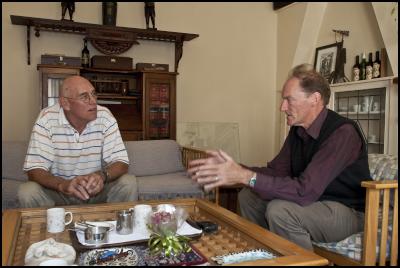
1981 Springbok Captain Wynand Claassen (left) discusses politics with John Minto at Claassen's home in Pretoria. Claassen said the Springboks were taken aback by the extent of the anti-tour protests in 1981 -- protests he described as a significant factor in undermining South Africa's apartheid system. He said he'd respected Minto's anti-apartheid views, felt no animosity towards the anti-tour protesters, and described the end of apartheid as "something that had to happen."
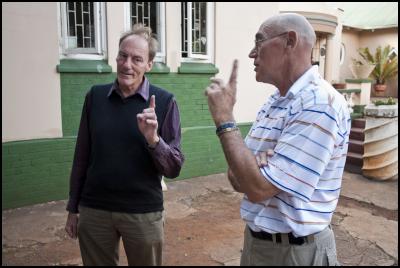
John Minto (left) and Wynand Claassen debate politics outside Claassen's home in Pretoria. Minto has expressed deep disillusionment with South Africa's three post-apartheid governments, claiming the ANC's economic policies "are locking poor people out of a chance of having a place in the sun." Claassen agreed that "there have been hard times. There have been a lot of things, as you say, that are not right." But he was upbeat about the future. "There are a lot of great people here, trying to make it work. I am one of those guys," he said. "It is my country, and I want to make it work."
ENDS


 Gordon Campbell: On NZ’s Silence Over Gaza, And Creeping Health Privatisation
Gordon Campbell: On NZ’s Silence Over Gaza, And Creeping Health Privatisation Richard S. Ehrlich: Pakistan & China Down 6 Indian Warplanes
Richard S. Ehrlich: Pakistan & China Down 6 Indian Warplanes Keith Rankin: War In Sudan
Keith Rankin: War In Sudan Ramzy Baroud: Netanyahu's Endgame - Isolation And The Shattered Illusion Of Power
Ramzy Baroud: Netanyahu's Endgame - Isolation And The Shattered Illusion Of Power Jeremy Rose: Starvation Of Gaza A Continuation Of A Decades-old Plan
Jeremy Rose: Starvation Of Gaza A Continuation Of A Decades-old Plan Keith Rankin: The Aratere And The New Zealand Main Trunk Line
Keith Rankin: The Aratere And The New Zealand Main Trunk Line